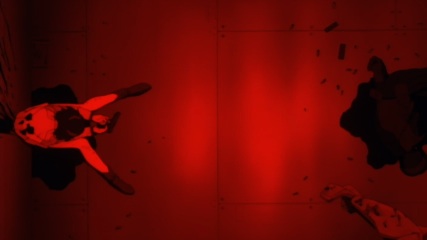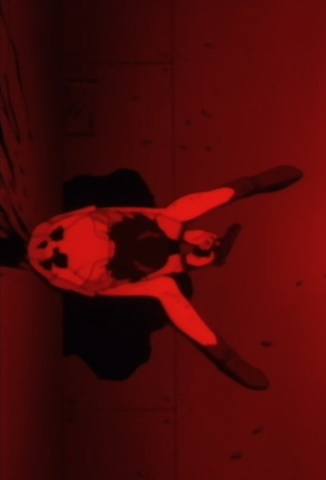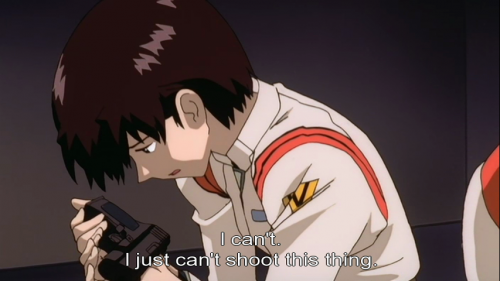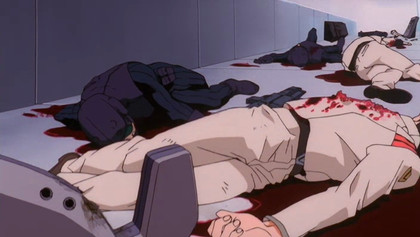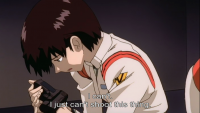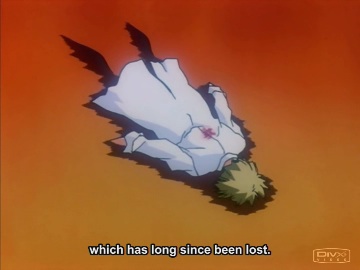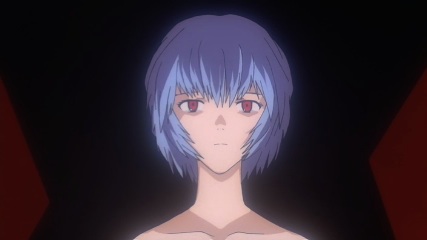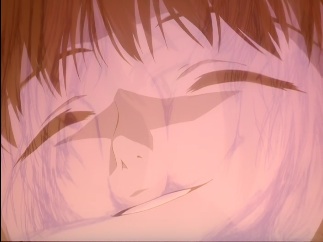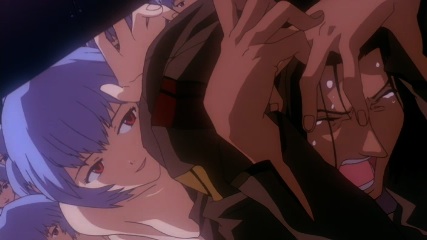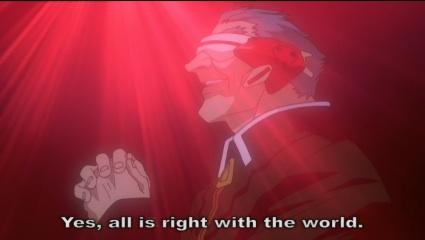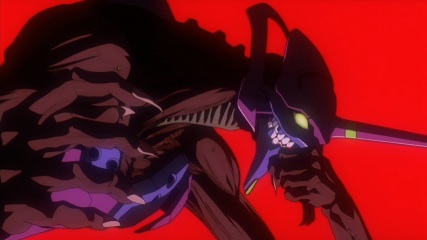User:Ran1/Dialogue Test Page
EoE: Anonymous NERV Girl is Dead
Shin-Sieki:
While pulling screen-caps for another topic, this cut in #26' caught my attention:
Now this cut is on screen for less than two seconds, and while I certainly recall seeing it, to the extent that I paid it any mind at all, it vaguely registered on my brain thus: female in NERV uniform + handgun = overhead shot of Maya, still being her useless-in-a-firefight self. But if you bother to pause and take a look at it, it's immediately apparent that this not Maya; for one thing, the red lighting (other cuts of the bridge in this part of the movie aren't under emergency lights), for another, the previous cut with Maya about a minute before shows her right where she's been since the shooting started (and where she stays in subsequent cuts): under the bridge console with her laptop:
So who is this, and what is going on here? When you take a close look, it's pretty grim:
She's slumped down in a pool of blood, with exit wounds on her back, and blood streaks running down the wall, and some spent rounds by her feet. In front of her, about ten feet away, what at first glance looked like a vague black blob turns out to be the body of a dead JSDF soldier, also surrounded by spent ammo and clips:
So I guess maybe the idea is something like this: he cornered her against the wall and shot her, but she was able to take him with her. I suppose the point of this cut is to illustrate why there's no more shooting from this point on in the movie: everyone's pretty much killed each other, leaving only Fuyutsuki and the others atop the command center alive.
So anyway, did anyone else notice this cut, and what actually was going on in it?
Interestingly, this is the third time in the movie that we've seen this 'slide down the wall, leave blood streak' deal; the first two times are a bit more obvious:
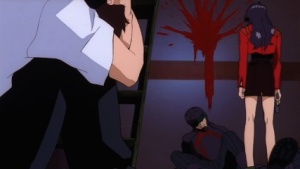 |
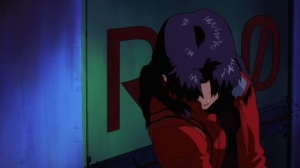 |
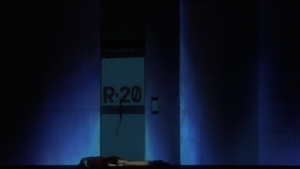
|
|
Three of a kind? | ||
Normally, when I see the same sort of thing three times in NGE, I figure that Anno is trying to make some point or other. The (karmic?) connection of the first two instances is pretty apparent, but I wonder what Anno may have had in mind by repeating this blood/wall/slide/streak thing yet again here. It's apparent that the red lighting serves to obscure what's going on in this cut; if it were normally lit, there'd be two big, bright, red pools of blood in the shot that would stand out, and make it much more obvious what we're seeing.
The PRPD:
I don't think it has any major significance.
Thoughts on a possible in-universe explanation: Some of them could have simply been backed into a wall with no where else to turn having to face their inevitable fate.
Possible behind the scenes explanation: It could have been done just for the sake of doing it and being grim. What could it mean other than showing the ruthlessness of the JSSDF soldiers?
Ornette:
That everyone's dead, thus why there's no more gunfire in the background.
Sachi:
Normally, when I see the same sort of thing three times in NGE, I figure that Anno is trying to make some point or other. The (karmic?) connection of the first two instances is pretty apparent, but I wonder what Anno may have had in mind by repeating this blood/wall/slide/streak thing yet again here.
Does it mean to serve Anno's opinion of war? Two sides shooting at each other, but both end up dying, bringing to question the reasoning behind the shooting in the first place. "Why? What is the point?" Does Anno have an anti-war sentiment, believing that pointless fighting only leads to tragic results? After the entire series of Evangelion, the constant fighting between the two sides at conflict, we do get the tragic ending of Shinji and Asuka alone on the beach in the ruins that war left behind.
I may just be shooting in the dark here, but this was my initial impression when reading the topic post.
EDIT: We also get the streak of blood left on the Moon, if that holds any relation to these three shots.
Ran1:
Looking at it from an purely editing standpoint, the shot really represents for a nice juxtaposition between two opposing forces that weigh heavily on the show, with Fuyutsuki bringing up how the Egg of Lillith is the source of all human life, and then that cut of the two dead agents.
Also, I doubt this is very significant, but it appears as if the dead female NERV agent is holding a pistol. Aoba offers her a similar pistol here:
And she says that she can't shoot it, to which Aoba responds
Maya never ends up shooting the pistol, and judging by her mental state, she was in no condition to. All things considered, she might have taken out one or two troopers before she finally kept her head up for too long and be tagged by JSSDF soldier, or something to the affect. Her killing a soldier and then dying, like the red screencap, would be something that refutes the kill or be killed statement, because both died.
So, I suppose that the image serves an albiet oddly designed juxtaposition. We could chalk this one up to Anno being artsy, though, and I doubt it has really that much plot significance.
If one really wanted to show the extent of the conflict that had taken NERV, it would probably work better to show a quick montage of wide shots spelling out the killing that took place in NERV's lower levels, no?
ObsessiveMathsFreaks
My view of the cut is that it is part of a series of shots throughout EoE showing the grim effects of the battle.
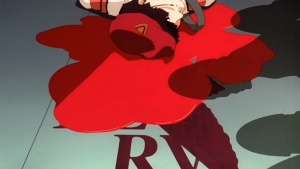 |
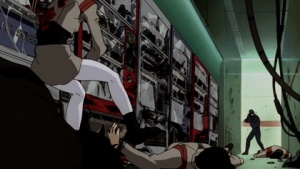
|
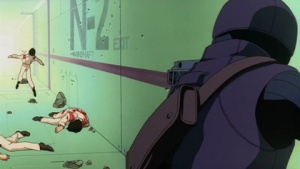 |
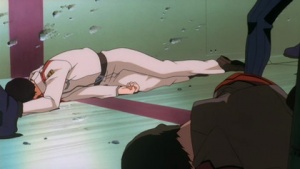
|
|
Episode 25' Cuts | |
This seems a reasonable assessment. However, there is no reason these two were necessarily the ones who killed each other. They may only be two dead soldier from opposite sides. Along these lines, and with regard to the following....
...I think the most similar cut to this red one is the following
Here again we have bodies of soldier from each side strewn about in the aftermath of the battle.
One of the big questions in EoE is actually how the bridge crew manage to seemingly be the only ones left alive in the command center. What exactly happened to all the SSDF forces and the Nerv personnel? While it seems a stretch to to say that essentially everyone is dead, these shots do seem to imply that this is indeed the case. However, I'm inclined to think that the attack has petered out over the interim and everyone is simply laying low. The JSSDF attack may also have stalled after Unit-02's or perhaps Unit-01's appearance.
One thing the layout of the cut brought to mind was that perhaps the Nerv operator had in fact shot herself after having been shot. See a higher resolution image, I don't think that's the case, but the way she is slumped over brings a suicide of some kind to mind.
Shin-Sieki:
Good catch! I think you may very well be onto something here, because EoE on the whole is stuffed full of scenes and/or bits of dialog that serve as ironic pay-offs to earlier scenes; it seems like irony is Anno's favorite flavor of dramatic device. So this cut could very well be intended (by showing a NERV tech that superficially resembles Maya, but who went down fighting) to show that it's more like "kill and be killed" rather than "kill or be killed". And maybe the correlation with Misato killing the soldier and her own death scene applies similarly as well...
AuraTwilight:
I find it ironic that not only is Aoba wrong in that the above mystery girl kills AND is killed, but also that Maya outlives literally everyone else without firing the damn thing. I'm pretty sure that not only does she live to see the start of Instrumentality, but she's also the last person on the Bridge to be Complemented, right?
(I wonder if it has anything to do with Giant Naked Rei feeling her up on her way upright.)
Shin-Sieki:
Allow me to recall something I posted above:
As a result of ruminating for a while over this question of what sort of point was Anno trying to make here, a certain pattern relating to the fate of all the significant characters in the movie has come into focus, and it would seem that Anno did have some sort of agenda in play in EoE with regard to the issue of karma <-(edit: scratch that) and violence / non-violence. (I should credit Sachi and ran1 for comments above that were helpful in pointing the way to the conclusion I've reached.)
Simply put, the fate of each character in EoE seems to correlate with whether said character, in the course of the movie, personally killed, or tried to kill, another human being. If you look at the characters systematically, with that criterion in mind, you see that there is a very consistent correlation of good end / bad end vs violence / non-violence. To wit:
Misato:
Violence: Yes. Kills the soldiers that were about to execute Shinji.
Fate: Bad end. Ends up getting shot herself, then blown to bits.
Ritsuko:
Violence: Yes. Tries to kill everyone by blowing up NERV HQ.
Fate: Bad end. Shot by Gendo.
Asuka:
Violence: Yes (and how!). Kills perhaps hundreds of JSSDF soldiers, plus gruesome hand-to-hand combat with the Harpies.
Fate: Worst end. Speared thru eye, etc, etc... ends up as harpy-chow.
Rei 3:
Violence? No. Goes skinny-dipping, betrays Gendo, returns to her true self (Lilith).
Fate: Good end. "Welcome home"
What?! I AM happy! This is Me. Being. Happy. Okay?"
Shinji:
Violence? No. The poster-boy of non-violence, to the extent of just passively sitting there as the JSSDF soldiers are about to execute him.
Fate: Good End, but has to go through hell to get there
Makoto:
Violence? Yes. Uses gun to defend the bridge from the assaulting JSSDF soldiers (altho, with a pistol at that range, I doubt he could hit anything...)
Fate: Hmm... Is this actually a bad end? Altho he gets what ought to be good end (having his dream-girl Misato passionately throw herself at him), his reaction is confused, being at least as much one of fear as it is of joy.
^Does he look happy?
Shigeru:
Violence? Yes. Uses automatic assault weapon to defend the bridge (has better chance than Makoto did of actually hitting something). And he gets to be the one to utter this sentiment, re Maya's squeamishness about shooting other people: "Idiot! It's kill or be killed!"
Fate: Bad end. Ends up cowering under the console, goes out shrieking in terror.
Fuyutsuki:
Violence? No. Just stands around, droning on expositionally the whole time.
Fate: Good end. The script describes him when Yui appears as "filled with joy"
Maya:
Violence? No. In fact, she says outright that she can't shoot people.
Fate: Best end. Goes out in passionate, knee-humping, explosion of ecstasy.
Keel:
Violence. No. Just sits on his fat cyborg ass, chanting and praying.
Fate. Good end. Okay, now this one pisses me off. Tho he gives the order that results in the cruel and violent deaths of thousands of people, apparently he gets a pass because he doesn't personally kill anyone.
Gendo:
Violence? Yes. Shoots Ritsuko.
Fate: Bad end. Gets chomped in half by Unit-01.
So... What do you think?
Ursus Arctos:
I think you're twisting things around quite a bit to fit the whole idea of karmic violence and non-violence. The fact that Keel, the single biggest cause of violence in the NGE universe (one of the people who instigated 2I, no less!) goes out the way he wanted to shows that karma has broken down. Besides, I fail to see how Ritsuko being shot by Gendo is any worse than being turned to tang.
Shin-Sieki
Note that I'm dealing strictly with what the character do or not do within the course of the movie. And besides, I think your being naive to imagine that conventional morality has anything to do with Third Impact and the fate of the characters. Don't even think of it as karma, if you're hung up on that; the matter of "did he or she personally try to kill anyone" is the main principal at work here.
I don't get what you mean, but remember also that Gendo says something to fuck with her head just before he shoots her. I still say bad end.
Xard: Shin-Seiki's theory goes beyond limits of credibility IMO
Ran1: I think the karma/non-volence theory has credibility because it is quite obvious that Keel (and the rest of SEELE) rests outside the karmic structure. They are essentially the prime movers behind 2I and 3I, which makes them the ultimate cause of any human interactions that are karmic. If I'm not mistaken, there are Hindus priests who through living a certain way can break free of the karma cycle, no? SEELE could be like those priests, independent of the karmic structure.
And Makoto looks bewildered in that shot. Sure he sees "Misato", but he knows the actual Misato went down to rescue Shinji. He's more surrendering to an illusion to anything else, and I doubt he's thrilled about it.
ObsessiveMathsFreaks:
While I think EoE does have a a theme on the pointlessness of violence, I'm not sure that there is a karmic death message going about.
Of these cases, Misato's is actually the one which makes the least sense. Here we have someone who in their final hours tries desperately to save the world and the person they care about, selflessly throwing themselves into the line of fire to do so. Why would the director choose to mark out Misato's actions in defending Shinji as wrong? And why do so while allowing Keel off so lightly.
The opposing cases of Hyuuga and Aoba also bring this viewpoint into question. Certainly, nether is more or less culpable than the other violence wise. Personally, I think the three cases of the Bridge crew are to demonstrate the gamut of reactions and emotions that would be felt by the victims of complementation. Some are frightened, some are ambivalent, and some are overjoyed upon encountering their transition guides.
There is simply a lot of random violence and death in EoE; and karma has little to do with it. Consider the fate of the JSSDF soldier who paused on the road to help his comrade. (click for larger images)
| Destruction for a purpose? | |
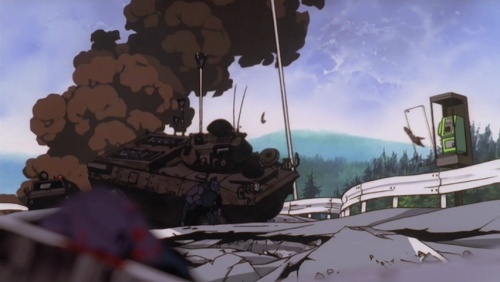 |
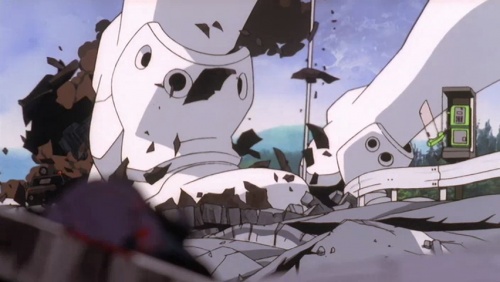
|
|
Epsiode 25' Cuts | |
Crushed carelessly underfoot by an Eva supposedly on his own side. No sense, no karma, just another random death. EoE is filled with these moments, and I think that even the original thread image falls into this category. The audience is subjected an orgy of senseless and pointless violence in the Grand Guignol of the End of Evangelion. Unsurprisingly, even the main characters do not escape.
EoE is not about people getting their just desserts. It's about the narrative tensions finally squeezing the characters so tightly that they eventually pop right open and explode into orange goo. After that, the healing can begin.
NemZ:
I think that the karmic death idea isn't quite correct. Instead, I offer this:
1) Asuka, Misato and Ritsuko die the way they do because of the insurmountable forces they choose to confront, not because of some sort of authorial fiat against violence.
2) Everyone who we see Rei taking out of the game, whether in pleasure, fear, or somewhere in between based upon how they judge THEMSELVES. Anything they see or feel before the end is their own rationalizing of their fate, not something Rei chooses.
3) Extras die purely for the sake of tension and storytelling. They have no karmic value because as far as the audience is concerned, they aren't really people.
UrsusArctos:
Okay, got your point. Could what happened with Shinji getting a lousy return to the real world post-3I have something to do with trying to strangle Asuka during pre-instrumentality? He even repeats the same action on the beach!
I think Ritsuko would have met the same fate as Aoba, since all love for Gendo had turned to hatred and there really wasn't anyone she could trust. I have to hand it over to you with the silent line - that sentence was meant to hurt her even more than the bullet did.
Ran1:
Your argument was solid, in regard to 1 and 3, and I was about to say so in regard to number 2, but there appears to be a catch-- or at least a characterization in need of clarification:
NemZ
He's a cynical nihilist bastard who likely views the world as just a collection of trivial facts rushing headlong into the future without purpose. Being swarmed by a seemingly endless flood of Rei who want to toss him into oblivion, against which he has no hope or defense, seems in keeping with that view.
ObsessiveMathsFreaks
I would disagree. I think they hold meaning in their meaninglessness. They are example of how senseless death can be.
In my opinion, the primary purpose of the case of Aoba's is to show how some people will always reject complementation and no transition guide can amend that . As I said above, his case is part of the spectrum of emotion that would be felt by those brought into complementation.
AgentKoopa
I think this is reading too far into the matter. IMO the shot of the dead NERV lady and the JSSDF soldier was just to set the apocalyptic mood. I don't think our heroes are the only ones left alive; Central Dogma is a big place and the bakelite would undoubtedly keep back the soldiers for a while. As well, it's fitting that Keel gets to melt with a smile on his face, seeing as this is the grand fulfillment of all of his plans. Gendo gets chomped because of his personal demons, not because of his violence. Ritsuko gets shot because Gendo doesn't want her blowing up the place, Aoba is just too lonely too see anything but a cloud of Reis and is too horrified by what he knows will happen to go out happily, Makoto is just more willing to go along with it, and Maya is almost in a breakdown when Rei/Ritsuko comes for her.
I think the form Rei takes at the end is meant to be more about the character themselves than about what their last actions were.
Miche
Going back to the original post, the image can be interpreted that the woman is still alive, if potentially fatally wounded. I wonder if this is some kind of (small) precursor to the decision Shinji has to make in the 2nd half of EoE; that is to remove oneself from suffering. In the case of the NERV woman, to turn the gun on herself rather than witness more tragedy and ugliness, whether from the JSSDF soldiers, or even things that she would have to do to survive herself (i.e. kill others). One of the first things I noticed about the image was the manner in which she is holding the gun: it's in her hands, but she isn't gripping it in an aggressive manner, ready for action in an offensive sense. It's almost gentle and contemplative.
I don't know, I could be reaching hard with this, but it's a different perspective I think to what has been mentioned thus far (which has been very interesting, of course).
Crosses [ANF]
Shin-seiki:
Actually, what the crosses represent is something I've never been able to figure out; they pop up as everyone gets liquified, but then they rise up into space at the end. It probably means something, but what?
I've read somewhere that the cross has various meaning in Eastern cultures and religion unrelated to the Christian connotation of sacrifice and resurrection. Of course, Misato's cross means sacrifice (her father gives it to her, and she gives it to Shinji), tho when we see her cross in Ep.26'(I need you), I very much want to attatch the meaning of resurrection to it...
Dr. Nick:
This is easy. Just place yourselves into the position of a normal wood-eyed Bruckheimer-fan teen-idiot: "Oooh, pyrotechnics! c00l!" I don't think there's anything deeper involved. :smokin:
MDWigs:
Ah my mistake. In that scene those crosses represent the souls of all of humanity. As for why they used crosses and not something else, well the creators thought crosses "looked cool".
@Sharp-kun:
Aren't the souls the red speheres though?
They are both. As Lilith's anti-AT Field is deployed, and sweeps across the globe, you see all these crosses appear and float up into the sky. You also see lots of little red dots a number of times representing souls. You also see a whole lot of Rei's swimming around at one point (which some take as representations of souls as well).
Sharp-kun:
You don't. The crosses pop up, but stay on the earth until the end, the red dots go to Lilith. If the crosses were souls, surely they would rise up as well, which they don't until after Lilith's death.
MDWigs:
Sharp-kun:
You don't. The crosses pop up, but stay on the earth until the end, the red dots go to Lilith. If the crosses were souls, surely they would rise up as well, which they don't until after Lilith's death.
You do actually. Check out the scene 1 hour, 21 mins and 15 seconds into the flim (I'm too lazy to make screencaptures and you need to see them rising anyway). The MP Evas fall to Earth and the crosses rise up from it. Yes this is after Lilith's death, but fits in with what they represent. I didn't mean to imply in my previous post that they float up straight away, there should have been "later" in there somewhere. Note I am not suggesting the red dots are not souls, just that crosses and the red dots (and the swimming Rei's for that matter) all represent different aspects of the souls of humanity (or maybe different types, I haven't decided yet).
tbozfan:
That makes no sense. Why would some go to the sky and some go to the sea?
Why would some go to Lilith initially and some rise up after she is dead? The crosses and the dots both appear as Lilith's anti-AT Field sweeps across the globe. There are far more dots than crosses though, and it is the dots that are drawn to Lilith, not the crosses, they are only released when the false lances are destroyed and the MP Evas fall to earth. I've got my own ideas about what each represent, but I think its clear they are both caused by the loss of an AT Field, which is know to release the soul.
Shin-seiki:
I agree that the crosses are somehow produced as result of the Anti-AT Field, but I thought of them as an artifact of peoples' souls being released, not as the souls themselves. When EVA-01 wields the Lance to make the Copy Lances burst (which indicates the end of the Anti AT Field), the crosses rise up and float off...not sure what that means, other than that Shinji and Asuka won't have to contend with a world with crosses of light everywhere. It's interesting that you mention that the swarm of Reis swimming inside Lilith may be souls, that what I thought the first time I saw them, but I think they're just Reis. BTW, what's up with the Reis giggling all the time? The clones in the Reiquarium are giggling as Ritsuko shows them to Shinji and Misato, she's giggling as she appears to Hyuga, and the Rei-swarm in Lilith are giggling too. Rei by herself is very solemn, but when there is a bunch of her around, it's like she's on laughing gas. Very creepy!
MDWigs: Shin-seiki:
I agree that the crosses are somehow produced as result of the Anti-AT Field, but I thought of them as an artifact of peoples' souls being released, not as the souls themselves.
My biggest problem with this idea is that there isn't a cross for each dot. If you take the dot to represent a soul, then there isn't a cross artifact for each soul.
It's interesting that you mention that the swarm of Reis swimming inside Lilith may be souls, that what I thought the first time I saw them, but I think they're just Reis.
Well in the black moon at least, a Rei heralds each soul's release. I think that is significant.
BTW, what's up with the Reis giggling all the time? The clones in the Reiquarium are giggling as Ritsuko shows them to Shinji and Misato, she's giggling as she appears to Hyuga, and the Rei-swarm in Lilith are giggling too. Rei by herself is very solemn, but when there is a bunch of her around, it's like she's on laughing gas. Very creepy!
Hehe I have no idea. Maybe an effect Anno put in to enforce the idea that the multiple Rei's are different from the one current Rei (ie the single Rei containing Lilith's soul, or the single manifestation of Lilith's soul that talks to Shinji).
A Dialogue on Anno's Auteur qualities
Between Eva Yojimbo and Xard:
